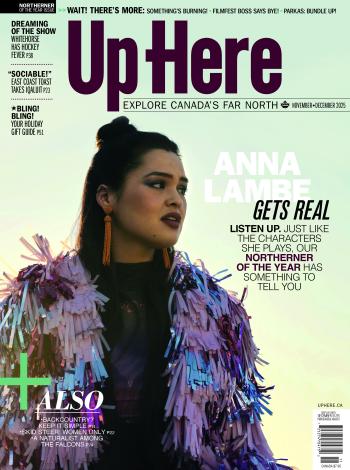It’s that simple and good feeling again—hunting with Kovalaq Totalik. Breaking free from town there’s an odd awareness that I should do this all the time; but for modern reasons, it’s a sometimes thing.
We’re in Taloyoak—the most northern mainland community in Canada—a place of rock, ice, and caribou. But not today. It’s a fresh blanket of southern-style snow, an iceless Arctic Ocean, and a silent, animal-less landscape—penitent and melancholy. Kovalaq seems like he’s having a good time, though. Ever jovial, this man. Even after seven years of living here, it seems still a far-away place to me. But for him, it’s the land of his childhood and family—and nourishment. Meat for bellies and a vastness for the soul. If I asked Kovalaq, my home-away-from-home ittuq (grandfather), he would say, “It’s a good day.”
We’re looking for muskox. Kovalaq is rolling on a hot tip. Rocky, an 11-year-old local boy, bagged one a few days ago. Kovalaq has brought his grandson, Mackenzie, and a last-minute add-on crew: younger brother Keith, Delilah, and my photographer buddy Jon. If there is good fortune, we’ll need the extra carrying capacity.
The ethics of it stay with me, and the faith. “Know what you’re looking for” is the order of the day. A mother and yearling? Some might, but not us. Umingmak on a tuktu day? No sir. Nanook, the white bear, walking straight for us during our tea break? We could shoot—the game officer does have bear tags. But why would we? Just scare the big fella off with a warning shot. No big deal for Kovalaq. Worth writing home about for me.
After the foregoing of ill-gotten gain, we hit upon a good-sized herd and the rounds get chambered. I could be pragmatic and say it’s just luck—that there’s no connection between passing up a mother and calf to coming across a full herd hours later. And maybe it is luck? But somehow I’m luckier when I’m with Kovalaq.
Despite being the person of knowledge and tradition on the land, Kovalaq entertains my novel ideas. “Hey, do you think if I stayed low, I could run down that bull?”
He smiles. “Try and see.” We have a laugh—then Ittuq gets serious and kills one.
One late autumn hunt Kovalaq indulged my wish to drive up the highest cliff and see “the view.” Generous, considering caribou don’t forage on rocky crags, and Kovalaq’s family can’t eat our tourist adventures. But we still enjoyed the outing. At our day jobs, we work in the same building and we sometimes point to that cliff visible from town and remember.
Today, we’re driving straight to the spot Rocky’s score made Facebook famous. Another of my romantic notions of Arctic hunting is laid to rest on the way. So much for tracking hoof prints in the snow, or finding an errant piece of ungulate poo and taking a healthy sniff to see how recent it is. Instead, we hit the trail and after 25 minutes of Jon oohing and aahing at the cerulean grey sea and gradient grey sky—ash to slate—Kovalaq stops.
“Qamiluguu,” he says. (Turn off your engine.) The man lights a smoke. We do this sometimes. After a few drags, he says, “See those rocks over there?”
I do.
“Muskox.”
I don’t react. He’s played this trick on me before.
But, alright, those rocks are standing pretty close together. I look through my riflescope. Wow! Shaggy, prehistoric, mammoth-esque goats.
“They’re stuck between the ocean and river,” Kovalaq adds. And us, of course. Look at the horns on those puppies!
A quick ride and we’re face-to-face with the animals. It’s Mackenzie’s day. We watch his granddad choose wisely, wait for the angle, then the lad makes his kill. The animal is butchered (an undertaking, indeed) and packed on our machines.
With the uncertainty of the hunt removed, we roll home feeling wholesome, simple, and good.










